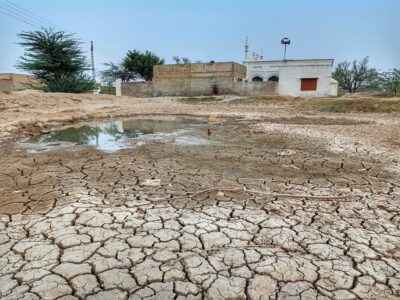Three Earth Institute projects are currently in contention for a $100 million grant from the MacArthur Foundation’s 100&Change competition. The foundation announced today that these three projects are among the top 100, selected from 755 initial proposals.
The 100&Change competition was created to award a single proposal that helps “solve one of the world’s most critical social challenges,” according to the foundation. The three Earth Institute projects include: one on ending toxic arsenic poisoning in Bangladesh; another that focuses on efficiently using water resources for farm and food management; and the third on removing carbon from the atmosphere.

Millions of wells across South Asia contain poisonous levels of arsenic. Arsenic impairs fetal growth, increases infant mortality, diminishes children’s intellectual and motor functions, reduces adult earnings, and accounts for 6 percent of adult mortality in Bangladesh. One reason is that most rural residents don’t know the status of their well.
The project proposes to test millions of wells for arsenic and distribute the results via a smartphone app. Installing low-arsenic wells and optimizing use with the app will eliminate over 100,000 annual deaths and raise annual income by US$800 million in rural Bangladesh.
The second Earth Institute project being considered looks at how satellite imaging can identify appropriate water interventions and farm-to-market integration, allowing smallholder farmers to help close the food gap and meet the meet the Zero Hunger Sustainable Development Goal. The project reflects the joint vision of Columbia University and Heifer Project International. the project lead. The Columbia component is being co-led by Carolyn Mutter from Columbia’s Center for Climate Systems Research and Upmanu Lall from the Columbia Water Center.
By 2050, the Food and Agriculture Organization estimates the world will be facing a 20,500 trillion calorie deficit, which requires a 56 percent increase from 2010. Smallholder farmers, who control 10 hectares or less, currently produce most of the world’s food. Based on academic consensus, efficiently using available water, with improved farm management, has the potential to triple farm production across countries in sub-Saharan Africa and Central America.
The proposed solution will reach the most marginalized people through three components: soil-to-space (connecting crop management and satellite imagery); farm-to-market (building healthy food value chains); and today-into-the-future (passing on resilient and sustainable solutions).
The third Earth Institute proposal to make the top 100 list looks at turning CO2 into stone. The “Solid Carbon” capture and storage project, was conceived by David Goldberg from Columbia University’s Lamont-Doherty Earth Observatory and is led by Ocean Networks Canada. You can read more about it here.
In addition to the three Earth Institute projects, a proposal by ICAP at Columbia’s Mailman School of Public Health was also named one of the Top 100. ICAP partnered with the Ministry of Health in Rwanda and the Clinton Health Access Initiative to put forth the proposal, which would enable Rwanda to become the first country to eliminate Hepatitis C. If successful, the initiative would prove that this deadly disease can be eliminated on a large scale and inspire other countries to follow Rwanda’s lead.
Each proposal was evaluated using four criteria: impactful, evidence-based, feasible, and durable. MacArthur’s board of directors will select up to 10 finalists from these high-scoring proposals this spring.
Since the inaugural competition, other funders and philanthropists have committed an additional $419 million to date to support bold solutions by 100&Change applicants. Building on the success of 100&Change, MacArthur created Lever for Change to unlock significant philanthropic capital by helping donors find and fund vetted, high-impact opportunities through the design and management of customized competitions. In addition to 100&Change, Lever for Change is managing the Chicago Prize, the Economic Opportunity Challenge, and the Larsen Lam ICONIQ Impact Award.
100&Change is a distinctive competition that is open to organizations and collaborations working in any field, anywhere in the world. Proposals must identify a problem and offer a solution that promises significant and durable change.



